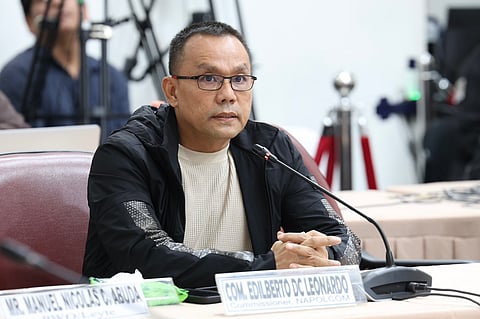
- NEWS
- the EDIT
- COMMENTARY
- BUSINESS
- LIFE
- SHOW
- ACTION
- GLOBAL GOALS
- SNAPS
- DYARYO TIRADA
- MORE

Resigned National Police Commission (Napolcom) commissioner Edilberto Leonardo has confirmed under oath the existence of a cash reward system in the Duterte administration’s brutal drug war, adding weight to the previous testimony of fellow cops who allegedly spearheaded the anti-narcotics campaign.
Rigid at first, Leonardo, the former chief of the Criminal Investigation and Detection Group in Davao City (CIDG-11), later admitted the scheme of payouts for killing drug suspects during the administration of former president Rodrigo Duterte.
During the ninth hearing of the House Quad Committee last Tuesday, panel co-chair Bienvenido Abante Jr. pressed Leonardo on the cash reward system for police officers who killed drug suspects.
“Second question, also answerable by yes or no, do you believe there was a reward system?” Abante asked, to which Leonardo responded, “I heard something, yes.”
With that, Leonardo corroborated previous testimonies of Police Lt. Col. Jovie Espenido and retired police colonel Royina Garma before the Quadcom.
Espenido was the first to confirm the kill orders, quotas, and incentives for killing drug suspects, while Garma revealed the monetary rewards ranging from P20,000 to P1 million, depending on the prominence of the target.
Garma, also the former general manager of the Philippine Charity Sweepstakes Office (PCSO), had previously testified that Duterte had ordered Leonardo to create a special task force to implement the killing of drug suspects nationwide.
The reward system, Garma said, was modeled after the “Davao template,” which was developed during Duterte’s tenure as Davao City mayor where cops were given cash for killing drug suspects.
In a briefing on Wednesday, Abante said the reward system had been clearly established.
Quad Committee chair Ace Barbers told reporters Leonardo’s corroboration would be included in the committee report which will be submitted to the Department of Justice.
Go denies involvement
In her testimony, Garma alleged that Duterte, his former special assistant now Senator Christopher “Bong” Go, and Leonardo were directly involved in the implementation of the drug war.
Go, however, has vehemently denied involvement in the controversial drug war, calling Garma’s accusation “malicious” and “unsubstantiated.”
In another case, both Garma and Leonardo were deemed the masterminds in the ambush killing of PCSO board secretary Wesley Barayuga in July 2020.
Leonardo resigned from Napolcom just weeks after that case was reopened in the Quadcom and is now the subject of investigation by the Philippine National Police.
Garma talked some more
Testifying for the fourth time before the quad comm, Garma loosened up about her knowledge of the inner workings of the Davao Death Squad (DDS).
According to Garma, the DDS, which had been accused of carrying out hundreds of killings on orders of then Davao City mayor Rodrigo Duterte — who became president in 2016 — was an open secret among cops but they were discouraged from discussing it.
“I became aware of the so-called Davao Death Squad through various sources during my assignment in Davao,” said Garma, who served as a police officer in Davao City since 1997.
“It was common knowledge among officers that almost all station commanders had special teams designated for specific operations. Although I did not know the identities of these teams, a culture of silence prevailed among police officers in Davao regarding such matters,” she said.
The “culture of silence,” she said, extended to police operations, where little to no oversight was maintained over killings conducted in the name of law enforcement.
In 2017, Arturo Lascañas, a retired police officer, confessed in a Senate probe that he had headed the DDS and killed nearly 200 people. He said he was paid millions of pesos.
Lascañas claimed the DDS, composed of Davao cops, were “motivated” to kill not only drug suspects and criminals but also Duterte’s political enemies and members of the media for the rewards.
Lascañas had named Leonardo as one of the DDS members that took kill orders from Duterte.
